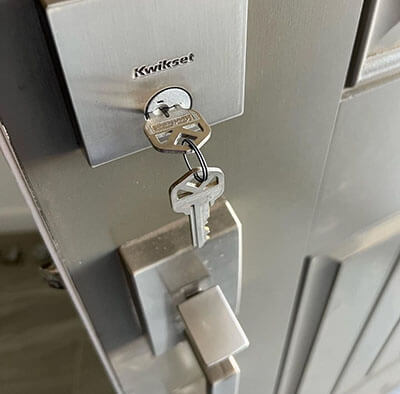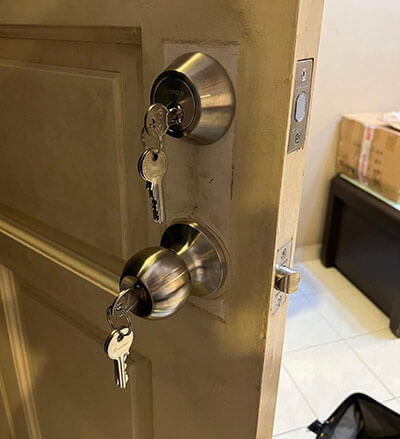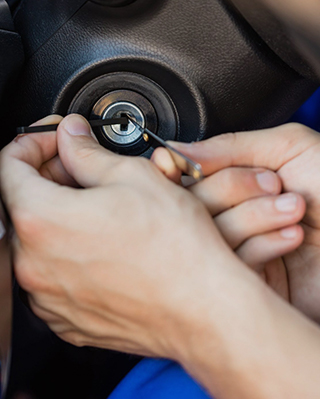What are the legal requirements for locks in London rental properties?
In London, as in the rest of the UK, landlords have legal responsibilities to ensure tenants' rental property is safe and secure. This duty involves several important safety and security measures, including providing adequate lighting in all communal areas of the building, functioning smoke alarms, adequately insulated rooms with working central heating, and ensuring that all locks on a rental property are in proper working order.
Top Locksmith is here to help change the locks, install new and updated locks, cut spare keys, and help make your rental property secure and safe for everyone.
Rental Property Security and Legal Obligation
 It is the landlord's responsibility to create a safe and secure property. One of the primary legal obligations is to provide a gas safety certificate. This certificate confirms that all gas appliances in the property have been installed and maintained by a Gas Safe registered engineer, ensuring they operate safely and efficiently and that the prevention of gas fires is firmly in place.
It is the landlord's responsibility to create a safe and secure property. One of the primary legal obligations is to provide a gas safety certificate. This certificate confirms that all gas appliances in the property have been installed and maintained by a Gas Safe registered engineer, ensuring they operate safely and efficiently and that the prevention of gas fires is firmly in place.
Locks and Keys Management
How many keys should the landlord and tenant have? Effective locks and key management are crucial for the security of rented properties and offer added security. Landlords should provide tenants with a full set of keys upon the start of the tenancy, which includes keys for all exterior doors and any other locks within the property.
Tenancy Agreement and Key Provision
The tenancy agreement should specify the number of keys provided and outline the process for requesting additional keys if the tenant loses them. This clarity helps avoid misunderstandings and ensures that both parties know their rights and responsibilities regarding property access.
The Tenant Fees Act and Housing Act protect the tenants' rights so they are not overcharged for unnecessary locksmith work. For example, if the tenant loses the keys or if the tenants change locks, they will only pay for the price of the lock change or lost keys.
All About AST (Assured Shorthold Tenancy
Assured Shorthold Tenancies (AST) are the most common type of residential tenancy agreement in England and Wales. They provide a straightforward arrangement between landlords and tenants who pay rent. Introduced by the Housing Act 1988, AST offers landlords a guaranteed right to reclaim their property after an initial fixed term, typically six months, provided they seek advice and follow the correct legal procedures.
One of the most critical requirements for landlords is paying tax on the profit earned from renting out a property. Landlords can reduce tax liability by deducting allowable expenses such as a lock change from their rental income.
Seeking Legal Advice To Change The Locks
Can a landlord change any locks or replace keys without the tenant's permission? Whether changing the locks due to rent arrears or having a new tenant, it is always advisable that tenants seek legal advice and ask for reasonable notice of any changes to the rental property's security. Seeking advice protects the tenant and landlord from unnecessary legal consequences.
The tenancy agreement is the foundational document outlining the rights and responsibilities of landlords and tenants concerning locks and keys. For instance, the contract should stipulate that tenants are not permitted to change the locks, sanitary fittings, appliances, or electrical fixtures without the landlord's consent, except in emergencies where security is compromised. This provision helps protect both parties' interests and ensures the property's security.
And one last note: Before such a move, tenants must also check the landlord insurance to ensure it covers lock changes.
Landlord Responsibilities
 Landlords are responsible for maintaining and repairing the locks on their rental property. This includes ensuring that all locks are functional and secure. Additionally, landlords should change locks between tenancies to prevent unauthorized access by previous tenants.
Landlords are responsible for maintaining and repairing the locks on their rental property. This includes ensuring that all locks are functional and secure. Additionally, landlords should change locks between tenancies to prevent unauthorized access by previous tenants.
This precaution is essential for safeguarding the property and providing prospective tenants with the assurance that their home is secure from past occupants who might still possess keys and wish to gain access, especially tenants who have been subjected to eviction proceedings or had an illegal eviction or neglected in paying rent and the local authority was involved.
Lock Maintenance and Repairs
Regular inspection and maintenance of locks are vital practices for landlords. By routinely checking that all locks are in good working order, landlords can address potential issues before they become security risks and need to change them entirely.
It is also advisable to keep a detailed record of all lock maintenance and repairs. This documentation provides a clear history of the property's security upgrades and can be crucial in resolving any disputes that might arise regarding the condition of the locks.
Tenant Rights and Responsibilities
Tenants have the right to quiet enjoyment of their home, which encompasses the right to security and privacy. To uphold this right, tenants must keep their keys safe and promptly report any lost or stolen keys to the landlord.
By doing so, they help to maintain the overall security of the property. Tenants should also be mindful of their responsibilities as outlined in the tenancy agreement, including any stipulations regarding the care and use of locks and keys.
Lock Changes and Copies
While tenants generally may not change the locks without the landlord's permission, there are exceptions in cases where there is a significant security risk, such as a lost key that could potentially be used to access the property.
In such situations, tenants should inform the landlord immediately to arrange for the locks to be changed. Although tenants can request additional keys, landlords are not obligated to provide them unless it has been previously agreed upon in the tenancy contract.
Best Practices for a Rental Property
To enhance the security and safety of a rental, landlords should implement best practices such as changing the locks between tenancies. This precautionary measure helps to ensure that when a tenant moves they can no longer gain unauthorized access to the property.
Additionally, landlords should consider providing tenants with a carbon monoxide alarm and ensuring that all electrical appliances are regularly inspected and maintained.
Changing The Locks Between Tenancies
Changing the locks between tenancies is a critical step that landlords should take to prevent unauthorized access. This is particularly important if the previous tenant fails to return all issued keys, which poses a significant security risk.
By changing the locks, landlords can provide new tenants with assurance that their home is secure from potential intruders.
Conclusion
By following best practices such as changing locks between tenancies, landlords can create a secure living environment that protects the rights and well-being of their tenants. For high-quality lock changes and lock repair work contact Top Locksmith today. We will change the locks for you fast and efficiently while proving friendly service.

 (020) 4538 1194
(020) 4538 1194